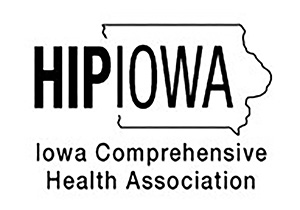HIPIOWA and HIPIOWA-FED Questions & Answers
Q: What is HIPIOWA?
A: The Iowa Comprehensive Health Association (“ICHA”), also known as “HIPIOWA,” is the State of Iowa high-risk pool. It was established to provide access to health insurance coverage to all residents of the state who are unable to obtain individual health insurance and meet certain eligibility requirements.
Q: Who is eligible for HIPIOWA?
A: HIPIOWA coverage is offered to state residents who have been rejected for health coverage due to medical reasons. The individual must have exhausted COBRA or state continuation of coverage. If there is a gap in coverage of over 63 days, the individual must satisfy a six-month pre-existing condition limitation.
Q: Who pays the premiums for individuals to be covered by HIPIOWA?
A: Enrolled individuals are required to pay premiums for the coverage. By law, HIPIOWA may not accept payment of HIPIOWA premiums by certain types of third-party payers although close family members may pay the premiums on behalf of the covered individual. The premiums are 150% of the average market rate of the top five individual carriers.
Q: What section of the Iowa Code prohibits third-party payers of HIPIOWA premiums?
A: Iowa Code Section 514E.7.5 provides: “An individual is not eligible for coverage by the association if any of the following apply: . . . (d) The individual premiums are paid for or reimbursed under any government-sponsored program or by any government agency or health care provider, except as an otherwise qualifying full-time employee, or dependent of the employee, of a government agency or health care provider.” Thus, HIPIOWA does not knowingly admit individuals into the program if the premiums are paid as proscribed in Section 514E.7.5.d.
Q: What is HIPIOWA-FED?
A: HIPIOWA-FED is an Iowa limited liability company organized by the HIPIOWA Board for the purpose of administrating the temporary federal risk pool (known federally as a PCIP pool) in the State of Iowa that is a product of the recent federal health reform law, the Patient Protection and Affordable Care Act (PPACA). HIPIOWA-FED is managed by HIPIOWA. HIPIOWA-FED operates through a contract with the U.S. Department of Health and Human Services (HHS) which was awarded to HIPIOWAFED following a response to an RFP issued by HHS. The HIPIOWA Board response to the RFP, which was accepted by HHS, used the existing state high-risk pool as a template or starting point and then changes were made where the RFP directed such changes.
Q: Who is eligible for HIPIOWA-FED?
A: The purpose of this “federal” pool is to provide access to health insurance for individuals with qualifying pre-existing conditions who have been uninsured for at least six months. Individuals must be residents of Iowa and in the US legally.
Q: Who pays the premiums for individuals to be covered by HIPIOWA-FED?
A: Enrolled individuals must pay the premiums for the coverage. HIPIOWA-FED does not allow third-party payers (as provided for by contract with HHS) although close family members may pay the premiums on behalf of the covered individual. The premiums are 100% of the average market rate of the top five individual carriers, so the HIPIOWA-FED premiums are lower than the HIPIOWA state risk pool premiums. In addition, pre-existing condition limitations or exclusions are not applied under HIPIOWA-FED.
Q: Who funds HIPIOWA?
A: HIPIOWA is funded through payment of premiums by individuals enrolled in the program and assessments paid by individual insurance companies insuring Iowans. These companies are allowed to offset the assessments from premium taxes over a five-year period.
Q: Who funds HIPIOWA-FED?
A: HIPIOWA-FED is funded through payments of premiums by individuals enrolled in the program and funding from the Federal Government. Initially, HIPIOWA-FED was allocated $35,000,000 for the entire period of the contract through December 31, 2014. However, that amount is subject to reallocation by HHS for 2013 and 2014. At the time the HIPIOWA Board implemented HIPIOWA-FED, there was general concern that the money allocated by the Federal Government would quickly run out. It was estimated that HIPIOWA-FED could adequately insure approximately 1,000 individuals. As has happened in many states, not nearly as many individuals applied as was anticipated. However, as also has happened in other states, the claims experience for the individuals enrolled in HIPIOWA-FED is much greater than originally projected.
Q: Why doesn’t HIPIOWA-FED permit third-party payment of premiums?
A: First, the contract currently in place between HIPIOWA-FED and HHS does not permit third-party governmental payment of premiums. Second, at the time that HIPIOWA-FED commenced operations, there was serious concern that the finite funding allocated by the Federal Government for the Iowa program would run out before 3 the end of the program. Third, HIPIOWA-FED was modeled after the existing HIPIOWA state high-risk pool which is prohibited by law from accepting certain third-party payment for premiums. Fourth, most third-party governmental payers prefer to pay the premiums for a reason. It is a way to shift the financial expenses to another entity. If the government agency funding the health care or drugs can pay less by paying the premium for HIPIOWA-FED, that agency reduces its expenses by shifting those expenses to the HIPIOWA-FED program. This would result in significant risk of loss not contemplated as part of the program.
Q: Don’t most states permit government agency payment of premiums?
A: While a number of state PCIP programs accept such payments, most that do have certain limitations to limit their financial risk. A review of the Comprehensive Health Insurance for High-Risk Individuals: A State-by State Analysis, Twenty-Fifth Edition, 2011/1012, indicates that many of the states that chose to operate the PCIPs in their state do not allow third-party payment of premiums.
Q: Why not just open up HIPIOWA-FED to third-party payers?
A: Recently, there have been articles in the newspaper about the possibility of a state agency paying the premiums for individuals in order to have HIPIOWA-FED coverage. Specific references were made to HIV patients who are receiving state assistance. As indicated in one of the articles, the State of Iowa has funding available for the drug expenses incurred by these patients. It is important to recognize that the addition of a significant number of individuals in HIPIOWA-FED could result in significant additional medical expenses for the pool. There was a limited amount of funding that was initially allocated over the duration of the program and specific funding beyond 2012 is yet to be determined. Without sufficient federal funding, the high-risk pool would have to terminate the coverage of individuals enrolled in the program prior to December 31, 2013 – a result no one would want to occur.
Q: Does HIPIOWA-FED refuse to cover HIV patients?
A: No. Such individuals would be permitted to enroll in HIPIOWA-FED provided they otherwise meet the HIPIOWA-FED eligibility requirements, such as Iowa residency and being uninsured for at least 6 months, and they or a family member pays their HIPIOWA-FED premiums.
Q: Are the administrative expenses for HIPIOWA-FED higher than other pools?
A: While savings were achieved by using the same administrative system and vendor as HIPIOWA, as a start-up operation that required a self-contained accounting system and separate bank accounts, there were one-time expenses that will be spread over the duration of HIPIOWA-FED under its contract with HHS. Other expenses are 4 based on monthly charges that are relatively higher per enrollee when the enrollment is just starting to ramp up. The contract with HHS limits expenses to less than 10% of the federal dollars plus the premiums paid by the enrollees over the life of the contract with HHS. HIPIOWA-FED is projected to come in well under that limit at the end the contract with HHS. Additionally, the program embarked on advertising to attract more individuals to HIPIOWA-FED. At the beginning of the program, such expenditures are particularly costly due to initial development costs.
Q: Isn’t HIPIOWA-FED part of the permanent solution for fixing healthcare delivery financing in the United States?
A: The HIPIOWA-FED program is a temporary program that was established until additional PPACA reforms are implemented in 2014. At that time, individuals regardless of their health status will be able to purchase insurance without evidence of insurability (at least that is what the law says at this point). It is important to remember that the rates charged by HIPIOWA-FED are standard new business rates based upon the average market rate of the top five individual carriers. They are not adjusted to reflect the extra costs of the pre-existing conditions present in those enrolling in the HIPIOWAFED risk pool. The HIPIOWA-FED program is a mechanism to fill the gap for those who can’t get insurance today and can afford to pay for it at standard rates. The PPACA reforms that will be implemented in 2014 will include subsidies to address the affordability aspect in the health coverage programs to be established as of January 1, 2014.

